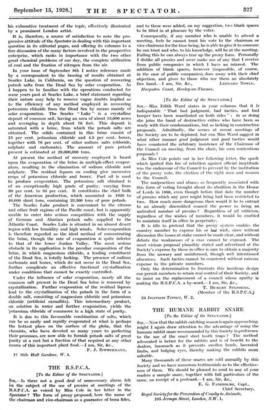[To the Editor of the SPECTATOR.] SIR,—MiSS Edith Ward states
in your columns that it is indisputable " That bad judgment, bad tactics, and bad temper have been manifested on both sides : in so doing she joins the band of destructive critics who have been so ready with their condemnations, but so lacking in constructive proposals. Admittedly, the scenes at recent meetings of the Society are to be deplored, but can Miss Ward suggest in what other manner good judgment and good tactics would have countered the arbitrary insistence of the Chairman of the Council on moving, from the chair, his own contentious proposals ?
As Miss Cole points out in her following letter, the spark which ignited this fire of rebellion against official ineptitude was the endeavour of the Council to prevent by the institution of the proxy vote, the election of the right men and women to the Council.
The malpractices and abuses so frequently associated with this form of voting brought about its abolition in the House of Lords in 1868, even though before that date the number of proxies which any peer might bring had been restricted to two. How much more dangerous then would it be to entrust to an already discredited council the power to bring an unlimited number of proxies ? Regardless of all criticism, regardless of the wishes of members, it would be enabled to maintain itself in office in perpetuity.
It is idle to pretend that the proxy system enables the country member to express his or her wish, since without discussion the issues at stake cannot be made clear, and without debate the weaknesses of a case cannot be exposed. The most vicious proposal plausibly stated and advertised at the Society's expense by those in office is sure to obtain a majority from the unwary and uninformed, though well intentioned absentees. Such tactics cannot be countered without ruinous expense to the private members.
Only the determination to frustrate this insidious design can permit members to retain real control of their Society, and to insist on the replacement of a council whose apathy is making the R.S.P.C.A. a by-word.—I am, Sir, &e., T. HUBERT STEPHENS.
(Member of the R.S.P.C.A.) 24 Inverness Terrace, W. 2.






































 Previous page
Previous page